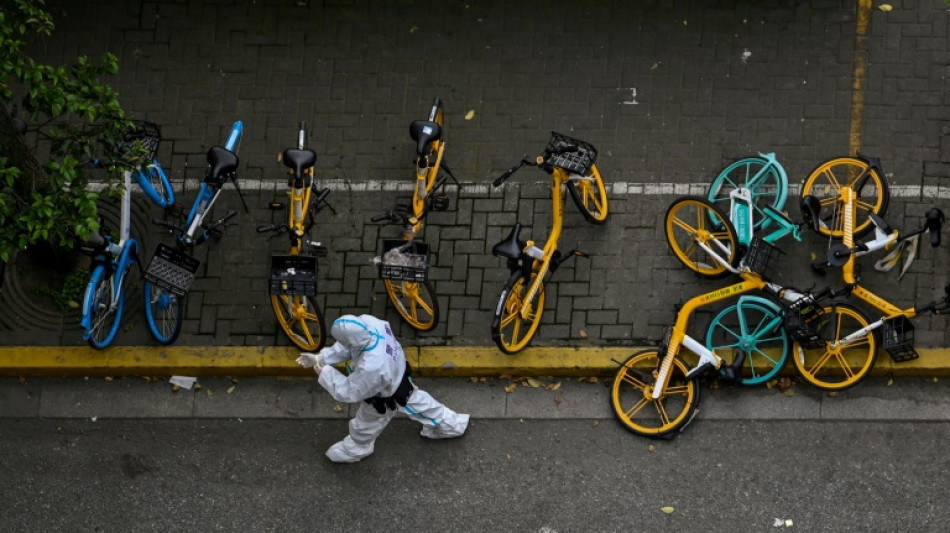
| RBGPF | 100% | 61.84 | $ | |
| RELX | -0.37% | 45.95 | $ | |
| RYCEF | -4.71% | 6.79 | $ | |
| NGG | 0.4% | 62.37 | $ | |
| CMSC | -0.24% | 24.55 | $ | |
| VOD | -0.81% | 8.68 | $ | |
| GSK | -2.09% | 34.39 | $ | |
| SCS | -0.75% | 13.27 | $ | |
| BP | 1.65% | 29.05 | $ | |
| RIO | -0.31% | 60.43 | $ | |
| BTI | 0.2% | 35.49 | $ | |
| JRI | -0.23% | 13.21 | $ | |
| BCC | -1.57% | 140.35 | $ | |
| BCE | -1.38% | 26.84 | $ | |
| CMSD | -0.02% | 24.725 | $ | |
| AZN | -0.38% | 65.04 | $ |
'No choice': Shanghai residents sent out of city during Covid crackdown

In the middle of the night, Shanghai resident Lucy said she and her neighbours were forced into buses and taken hundreds of kilometres away from the locked-down Chinese metropolis to a makeshift quarantine centre.
Most of Shanghai's 25 million residents have been confined to their homes for weeks as the city battles a major Covid outbreak. Hundreds of thousands of virus-positive people have been taken to makeshift facilities as China does not allow them to quarantine at home.
But some residents who tested negative told AFP that they were also forced out of their homes and taken to camps outside the city, some hundreds of kilometres away.
"The police told us that there were too many positive cases in our compound and if we carried on living here, we'd all become infected," Lucy told AFP, using only her first name for privacy reasons.
"We had no choice."
She said the virus-negative group were sent to a quarantine site containing hundreds of single-room prefab cabins in neighbouring Anhui province, 400 kilometres away, and that it was not initially clear where they going.
Lucy added that she does not know when she can go home.
AFP spoke with other Shanghai residents who said healthy, virus-negative people in some housing compounds were sent to other provinces for quarantine.
One said his neighbours had protested and refused to join.
Another from the city's Jing'an district told AFP she was taken, along with dozens of people from her residential compound, to a single-room quarantine centre in Anhui late one night.
"We all received calls from the neighbourhood committee saying that since there are too many positives in our compound, the negatives need to be transferred to hotels for isolation," that resident told AFP, preferring to stay anonymous.
She said they "felt terrified" on seeing the temporary accommodation, and had "lost trust in the Shanghai government."
- Extreme measures -
Shanghai on Monday was under a patchwork of different restrictions as new virus cases dropped to around 7,000, with 32 dead.
City authorities have imposed a three-tiered system of "freedoms", although stringent local enforcement appeared to still restrict the majority of residents to within compounds or neighbourhoods.
China's relentless pursuit of a zero-Covid policy has left many Shanghai residents chafing under the tight curbs.
The Shanghai government did not immediately respond to a request for comment.
Officials in the economic hub are likely under more pressure than elsewhere to achieve "zero-Covid at the community level" -- meaning no transmission outside quarantine centres -- according to Yanzhong Huang, senior fellow at the New York-based Council on Foreign Relations.
"When they face strong pressure from above to achieve zero-Covid targets, these heavy-handed, excessive measures become more likely."
"Moving negative people could be considered a pre-emptive strategy, with the expectation that more positive cases may be found if they stay there," Huang added.
Chinese officials are routinely sacked after virus outbreaks for perceived failures in Covid control.
Tens of thousands of close contacts of virus cases have been quarantined in neighbouring provinces, according to official news agency Xinhua.
But there has been no mention in official media of the relocation of negative cases.
Shanghai authorities have faced wide criticism after they initially announced phased four-day lockdowns in different parts of the city that were not then lifted.
Tall metal barriers were erected around some locked-down compounds in recent days, as part of measures described as a "hard lockdown".
D. Wassiljew--BTZ

 London
London

 Manchester
Manchester
 Glasgow
Glasgow
 Dublin
Dublin
 Belfast
Belfast
 Washington
Washington
 Denver
Denver
 Atlanta
Atlanta
 Dallas
Dallas
 Houston Texas
Houston Texas
 New Orleans
New Orleans
 El Paso
El Paso
 Phoenix
Phoenix
 Los Angeles
Los Angeles



